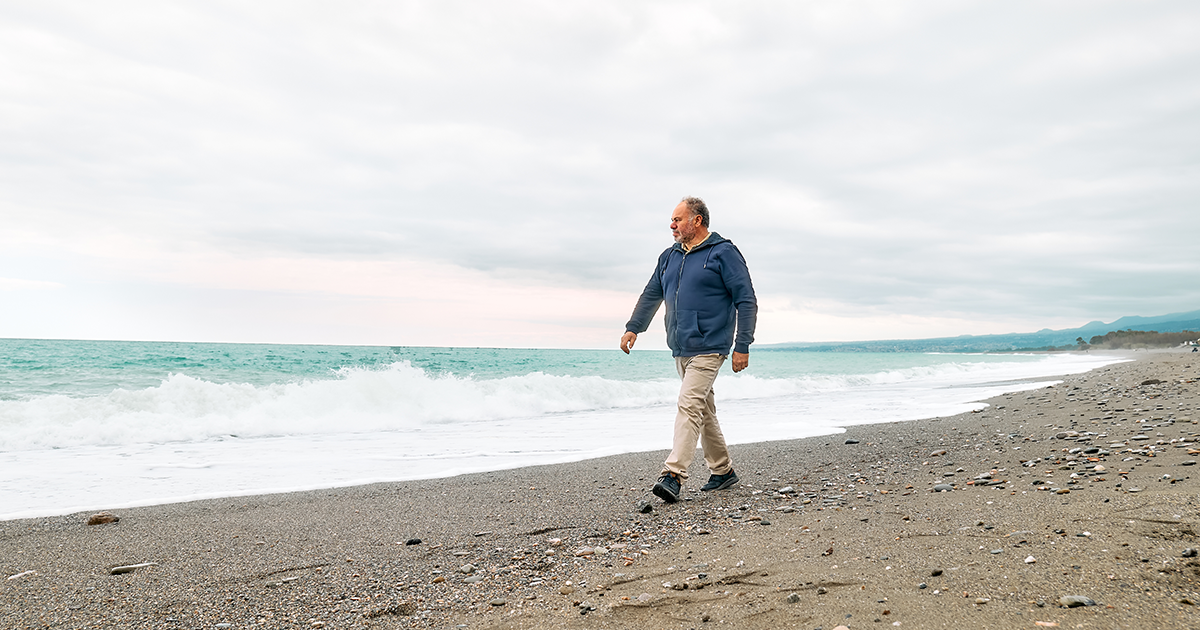When was the last time you found yourself sitting at home, feeling a little bored or a little aimless, wishing you had someone to spend time with? Next thing you know, you’re scrolling through social media. Or perhaps you call someone but they don’t answer. You feel lonely. Maybe even rejected or emotionally empty.
These feelings are normal. And common. Fifty-eight percent of U.S. adults say they’re lonely, finds a 2022 Cigna Group survey.
But, hey, we get it. Knowing you’re not alone in your loneliness doesn’t make it easier to deal with.
We’ll share 7 ways you can start feeling better now. But first, let’s dive into what loneliness is and why it matters. Understanding what you’re feeling can help you better manage it.
What is loneliness?
The American Psychological Association defines loneliness as the emotional distress we feel when our needs for intimacy and companionship aren’t met. It doesn’t necessarily mean you’re alone. You can constantly be around people and still feel lonely. Conversely, you could also spend most of your time in solitude and be perfectly happy.
Loneliness occurs when you feel like there’s a mismatch between the relationships you want and the ones you have.
Researchers believe there are two types of loneliness:
- Emotional loneliness: a lack of intimacy and attachment in relationships, particularly romantic relationships
- Social loneliness: a social network that’s lacking in quantity, quality, or both
There are a number of things that can cause emotional and social loneliness. For instance, getting sick, moving, or starting a new job. There are also cultural shifts happening that you may not be aware of. Like how the average time we spend alone each month increased by 24 hours between 2003 and 2019.
Some of these factors may be within your control. Others, not so much. Either way, being aware of them can be helpful. We’ll explain why — and how you can harness that knowledge to create change — below.

Achieve your mental wellness goals
AbleTo programs give you 24/7 access to tools, activities, and content tailored to your needs. Sign up or log in to start exploring.

Who gets lonely?
Loneliness affects a huge swath of people. The issue is so concerning that the US Surgeon General Vivek Murthy recently issued an 82-page advisory on the issue, calling it an “epidemic.”
As mentioned above, 58 percent of adults report feeling lonely. But some adults are affected more than others. Murthy’s advisory notes that you’re more likely to be lonely if you are:
- From a minority ethnic or racial group
- LGBTQIA2S+
- Living with a disability
- Financially insecure
- A single parent
- A young adult
- Of poor mental or physical health
- Living alone
Young adults, especially, seem to be hurting. In the Cigna survey, 79% of adults age 18 to 24 said they were lonely compared to 41% of seniors age 66 and older. And the Surgeon General’s advisory points out that the rate of loneliness among young adults has increased every year between 1976 and 2019.
“While the factors above may increase the risk for loneliness at the population level, your individual risk will depend on many other lifestyle and health factors,” says Hayley Quinn, PsyD, Senior Manager of Clinical Product Experience at AbleTo. “If you are in a high-risk group, monitoring your lonely feelings over time and being proactive with addressing them can be helpful.”
Why does loneliness matter?
Murthy notes that loneliness is more widespread than other major health issues, such as smoking and diabetes. And yet, additional research shows that less than 20% of people who often or always feel lonely or isolated see it as a problem.
But research shows it is. When loneliness and social isolation become prolonged they can increase your risk of conditions like anxiety, depression, and even dementia.
“Increased research into loneliness is helping us understand the negative effect it can have on our mental and physical health,” says Quinn. “But the reverse is also true. Connecting with others can help us live longer.”
7 ways to manage feelings of loneliness
Just as the causes of loneliness can vary, so can the solutions. Give the tips below a try and see what feels good to you.
1. Make space for your feelings
Just admitting to yourself that you’re lonely and noticing how that feels in your body is a wonderful act of self care. These feelings can be hard feeling to sit with. But taking time to journal, meditate, and better understand what you’re experiencing can help make loneliness feel less scary and permanent.
2. Look for patterns
“Try to notice when loneliness comes up in your life,” suggests Quinn. Are certain moments or situations that are especially hard? What about these moments is so difficult? Is there a theme or pattern that you can see?
Jot down any insights. You can track them using the Freewrite Journal in your AbleTo program. Or, simply use a pen and paper. “Just the act of being willing to acknowledge your lonely feelings and name them is a huge step,” says Quinn.
Next, think about what’s in your control versus what isn’t. “There are some things that may not be realistic to try to change.” says Quinn. “It’s best to take note of that and instead focus on what you can control.”
3. Join a new activity
Sure, this one can be tough to do, especially if you’re an introvert. But if you give it a go, you’ll likely meet people with shared interests. Think about what speaks to you, and then go after it, whether that’s a book club or a beach clean-up day.
4. Take a nature walk
Research shows just 5 minutes of “green exercise,” can help boost your mood and self-esteem. If you’re feeling up for it, ask a friend or family member to join you.
5. Nurture your relationships
Connecting with others when you’re not feeling your best can be hard. You might feel anxious. Or fear being rejected in some way. Or maybe you just don’t have the energy. “Being aware of these feelings is important,” says Quinn. “But you should still try to prioritize building and maintaining social relationships in spite of them. It might feel like a “chore” at times, but it is worth it.”
So think about what you can do today, this week, or this month. Can you send a letter or email? Make a phone call? Or meet up with a friend at the park? Start small and focus on things you can build off of.
6. Limit social media
Our relationship to social media can be complex. Research shows social media can both increase and decrease feelings of social isolation. It all depends on how we use it. The next time you find yourself scrolling through your feed, take a minute to notice how you feel. If negative emotions come up, consider logging off or restricting your usage.
In one study, students who limited their social media usage to 10 minutes per platform per day felt less lonely and depressed than those who didn’t. If you’re not a student, it’s still worth giving social media time limits a shot. Researchers suggest capping your usage at 30 minutes a day.
7. Ask for help
If you’re struggling with feelings of loneliness, a mental health professional can be a great person to confide in. Remember that AbleTo therapists and coaches are always here for you if you need extra support.
You’re not alone
Your social needs are unique to you. And those needs may change over time. Check in with yourself every now and again to see how you’re doing. Ask yourself what you might need more (or less) of in your life.
If you’re up for it, try taking one small step right now to feel a little less lonely today. You deserve to feel supported. We all do.
Need help putting these tips into practice?
You may be eligible for virtual therapy, coaching, or on-demand self care from AbleTo. Each program is designed by clinicians and grounded in science. Sign up today and get the support you deserve.
By Katie Nave
Katie Nave is a writer and mental health advocate living in Brooklyn, New York. Her work has been featured in publications including Newsweek, Glamour, Business Insider, and Motherly. She has served as a producer for the National Women’s March and worked with organizations like Girls Inc. and CancerCare.
Clinically reviewed by Hayley Quinn, PsyD, Senior Manager of Clinical Product Experience at AbleTo.
Photo by Caterina Trimarchi/Adobe Stock. Individuals in photographs do not represent AbleTo participants.
The information featured on this site is general in nature. The site provides health information designed to complement your personal health management. It does not provide medical advice or health services and is not meant to replace professional advice or imply coverage of specific clinical services or products. The inclusion of links to other websites does not imply any endorsement of the material on such websites.


